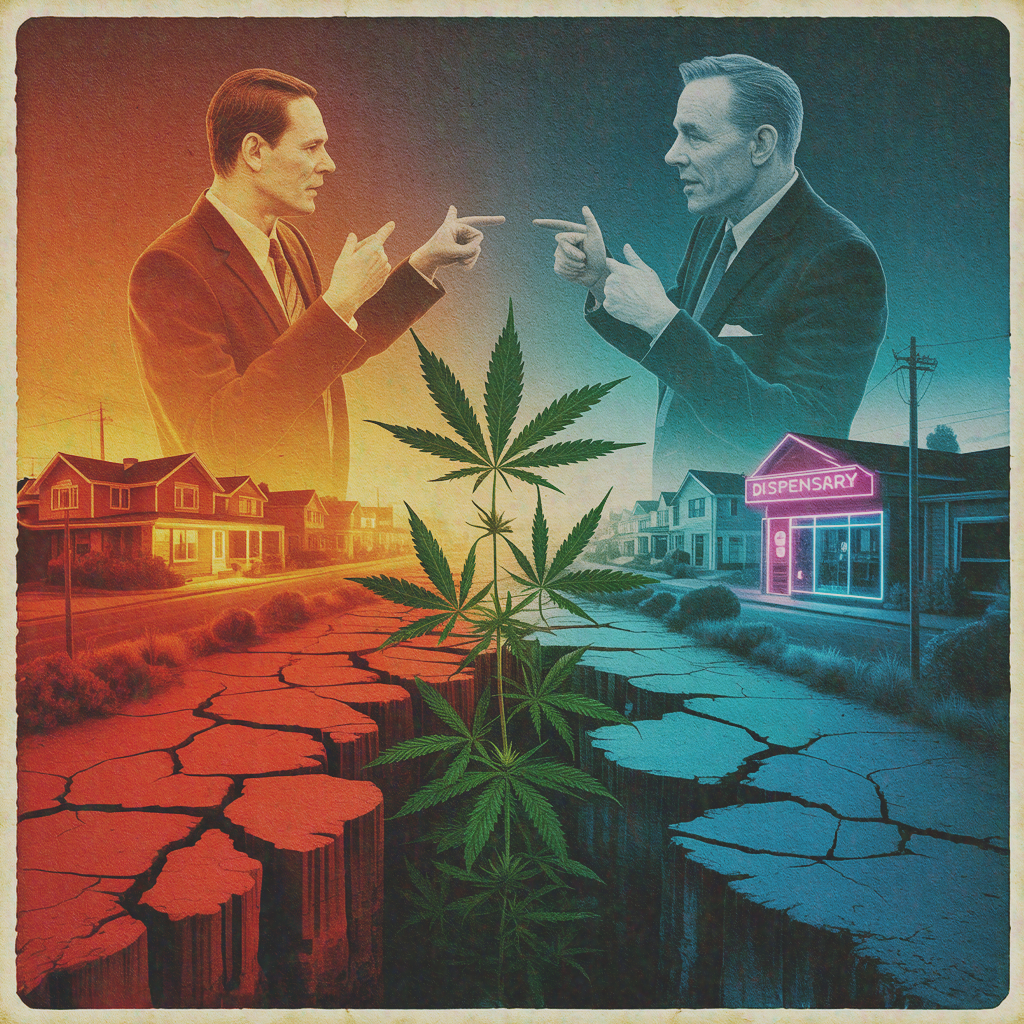How cannabis legalization reflects deeper political divides in America
The smell of a freshly opened dispensary tinted this conservative suburban street a little green yesterday — where once parking lots housed bank branches and SUVs idled at tennis-club pick‑up lines, now a modest sign flickers: “Adult‑Use Cannabis.”
A college dorm down the way buzzes with vape pens. A U.S. senator pivots and dodges the question in an interview: legalize or not?
It’s a point of change and contradiction. Public opinion according to Gallup and Pew Research Center shows that cannabis legalization has migrated from the fringes to the mainstream — except inside one major party. Whereas roughly 85 % of Democrats and 66 % of independents now support legalization, Republican backing stalls just shy of the 50‑percent mark.
That split marks more than policy—it signals an ideological fault line. Cannabis legalization isn’t just about weed. It’s about what kind of country America wants to be.
From Counterculture to Commerce
The fight over cannabis began as a symbolic skirmish of the 1960s: flower children, jazz riffing, the War on Drugs. Propaganda equated pot with deviance; headlines warned of “reefer madness.” By the 1990s, however, the medical‑marijuana movement began eroding stigma.
Patients with glaucoma and HIV/AIDS argued for relief, and states started responding.
The 2010s launched the so‑called “green rush.” Adult‑use markets opened. Business suits replaced overalls. Public‑opinion curves curved sharply upward.
Gallup found that support for legalizing marijuana rose from 12 % in 1969 to about 70 % in 2023. Meanwhile, reformers realized that industry growth often outpaced political reform — companies popped up faster than Congress acted.
Here in Arizona, a red‑leaning state, the expansion of cannabis business serves as an example. Despite conservative leadership, the regulated cannabis sector thrives.
The contradiction stands: in state capitals where leaders drag their feet, commerce moves ahead. That gap between policy and practice sets the scene for the broader story.
Democrats and Independents: Weed as a Civil Liberty
Among Democrats and independents, support for cannabis legalization has moved from niche to normal. Why? Because the issue touches core values: bodily autonomy, harm‑reduction, economic pragmatism.
For Democrats, especially, legalization sits inside a broader criminal‑justice reform agenda. Under‑resourced communities, racial disparities, harsh sentences for possession — these are now entwined with the cannabis story.
Legalization becomes not only about adult use, but also about rewriting past wrongs, freeing people from disproportionate policing.
Independents often approach the issue differently: common sense meets free‐market logic. They see that prohibition’s costs outweigh its benefits. They watch neighboring states generate tax revenue, create small‐business opportunities, expand tourism. They think, “Why not?”
Pulling in veterans’ access, medical research, and small‐business development shows how legalization transcends left‑right labels. When a wounded former‑service member uses cannabis instead of opioids, the shift stops being herbal politics and becomes practical health policy. Economic pragmatism meets compassionate reform. The momentum is clear.
Republicans: The Culture‑War Holdout
Here is where the narrative gets complicated. Support for cannabis within the Republican‑identifying public has faltered. According to Pew, as of early 2024 just 42 % of Republicans favor legalizing cannabis for medical and recreational use — far below the rates among Democrats.
Gallup‑derived numbers from 2023 show roughly 55 % of Republican‑leaning respondents endorsed legalization.
Why the gap? Internal conflict: the libertarian wing of the GOP emphasizes states’ rights and minimal regulation. They champion markets, personal choice. Simultaneously, the moral‑conservative wing views cannabis through the prism of vice, crime and decay. The coalition fractures.
Red‑state hypocrisy abounds. Take Oklahoma with a booming medical cannabis market operating in a traditionally conservative government.
Take Florida’s entrepreneurs building pro‑business cannabis ventures while state legislators drag their feet on full legalization. The party rhetoric resists reform, while grassroots business interests and voters move ahead.
In short, the GOP appears caught between nostalgia for the war on drugs and inevitability of reform. As the rest of the country moves on, at least for now the party seems anchored in the past.
The Generational Fault Line
Age turns out to be a stronger predictor of views than party in many cases. Younger Americans, regardless of political label, see cannabis as normal. Older generations still view it through crime and morality lenses.
According to Pew, among adults under 30, about 65 % support legalizing cannabis for both recreational and medical use; among those 75 and older, just 31 %. Among Republicans ages 18‑29, roughly 57 % now favor legalization, yet among older Republicans support plummets.
There’s irony here: a young conservative may consume cannabis socially, yet still oppose policy reform or vote for politicians who do. Usage and ideology diverge. Cannabis has become a cultural equalizer for younger voters: what was once counterculture now simply is. Policy, however, lags.
Generations don’t just change habits; they reshape norms. As younger Americans assume greater political weight, the cultural terrain shifts. For the GOP especially, failure to adapt could mean growing irrelevance on this issue.
Industry Reality: Red States Go Green
Here’s the twist: while red‑state legislators often resist full legalization, the economic reality runs ahead. Cannabis businesses, farms and dispensaries are booming in states dominated by Republicans. Commerce doesn’t care about party decorum.
Take the example of Arizona again—border red state in many ways, yet deeply invested in the regulated cannabis industry. Capital flows into GOP‑leaning states. Investors, donor networks, entrepreneurs all see opportunity. Even donors affiliated with conservative causes are investing in cannabis ventures. Capitalism, it seems, is more bipartisan than rhetoric.
This contradiction matters. Voters may oppose reform, politicians may delay. But the tax receipts, employment gains and business growth march on. Regulators scramble to keep up. The green tsunami meets red terrain and the result is messy, fast and commercially driven. Policy eventually will reflect practice—or it will be left behind.
Media, Messaging, and the Myth of “Fentanyl Weed”
As normalization advances, so too do fear‑mongering campaigns. One recurring theme: the idea of “fentanyl‑laced weed” used in political messaging. The Drug Enforcement Administration and allied groups have amplified anti‑cannabis narratives, sometimes overstating risks or painting reform as gateway chaos. Polling shows that Republicans are far more likely than Democrats to believe legalization increases other‑drug use or harms community safety.
These campaigns aren’t just about cannabis; they’re about culture and control. The underlying narrative: reform = moral decline. Yet the data often contradicts this. States with legalization aren’t uniformly seeing surges in youth use or community breakdown. Policy reform proves resilient; the fear narrative stale.
The partisan messaging here is telling. When cannabis becomes a symbol rather than substance, it becomes a target of culture war. Reform advocates emphasize equity, health and commerce. Opponents emphasize danger, disorder and moral decay. The messaging gap reflects the ideological gap.
The Green Consensus
The Gallup chart stands as a snapshot of two Americas: one evolving toward normalization, the other anchored in denial. Across demographics, the question is no longer if cannabis legalization will happen, but when and how. The real divide is not within the public—it is between public sentiment and party politics.
Cannabis legalization has grown into a mirror of American politics. It reflects progress, hypocrisy and contradictions of freedom. The green—industry, culture, reform—pushes ahead. The red—rhetoric, tradition, regulation—hesitates. The blue—liberal reform, bodily autonomy, justice—accelerates.
Ultimately, culture moves faster than law. The generation coming of age treats cannabis as routine. The industries, the consumers, the small‑business owners already act accordingly. Policy will have to catch up. For the GOP, the choice becomes adaptation or irrelevance on this turf.
For the nation, legalization won’t just be a matter of weed—it will be a statement of what kind of country America wants to be.

***
Trap Culture is the ultimate destination for cannabis enthusiasts who want to experience the best of Arizona’s cannabis culture. Whether you are looking for the hottest cannabis-friendly events, the latest news on cannabis legalization, trends in the industry and exclusive, limited-edition products from the top brands in the market, Trap Culture has you covered. Visit our website to learn more about our events, our blog, and our store. Follow us on social media to stay updated on the latest news and promotions. Join the Trap Culture family and experience the most immersive and engaging social cannabis events in Arizona.
Follow us on social media




